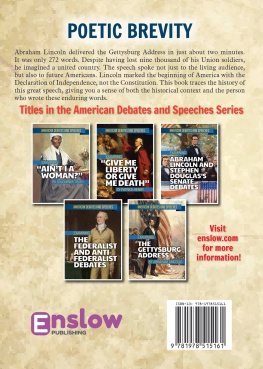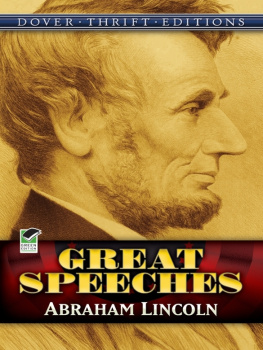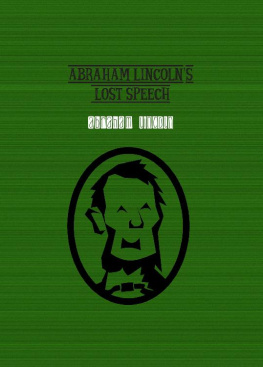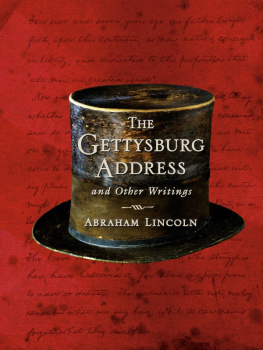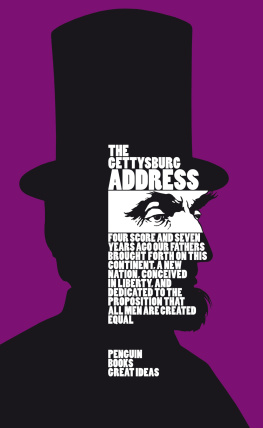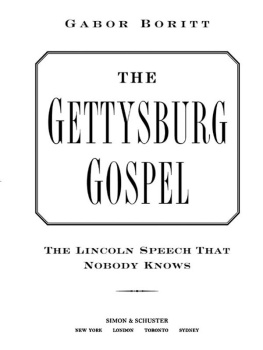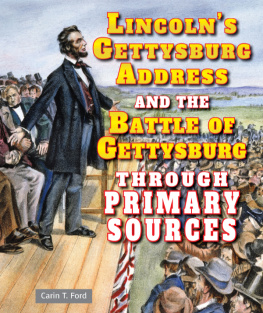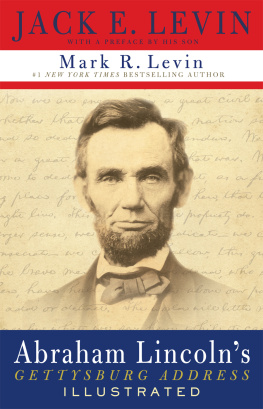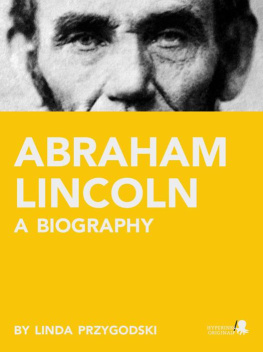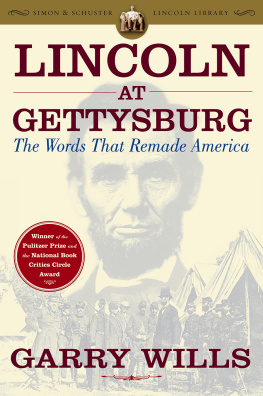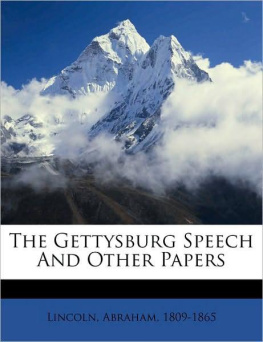
Published in 2021 by Enslow Publishing, LLC
101 W. 23rd Street, Suite 240, New York, NY 10011
Copyright 2021 by Enslow Publishing, LLC
All rights reserved.
No part of this book may be reproduced by any means without the written permission of the publisher.
Library of Congress Cataloging-in-Publication Data
Names: David, Alex, author.
Title: Examining the Gettysburg Address by Abraham Lincoln / Alex David.
Description: New York, NY: Enslow Publishing, 2021. | Series: American debates and speeches | Includes bibliographical references and index. | Audience: Grades 6-12.
Identifiers: LCCN 2019014895| ISBN 9781978515161 (library bound) | ISBN 9781978515154 (pbk.)
Subjects: LCSH: Lincoln, Abraham, 1809-1865. Gettysburg address. | Lincoln, Abraham, 18091865. | Speeches, addresses, etc., American--History and criticism. | United States--History--Civil War, 1861-1865--Causes. | Soldiers National Cemetery (Gettysburg, Pa.)
Classification: LCC E475.55 .D38 2020 | DDC 973.7092--dc23
LC record available at https://lccn.loc.gov/2019014895
To Our Readers: We have done our best to make sure all websites in this book were active and appropriate when we went to press. However, the author and the publisher have no control over and assume no liability for the material available on those websites or on any websites they may link to. Any comments or suggestions can be sent by email to .
Portions of this book originally appeared in Lincolns Gettyburg Address: A Primary Source Investigation by Steven P. Olsen
Photos Credits: Photo research by Bruce Donnola
Cover, pp. (interior pages abstract textures and patterns)
CONTENTS
INTRODUCTION
A braham Lincoln was not the first choice to speak at the Soldiers National Cemetery ceremony. The organizer, David Wills, wanted a poet like Henry Wadsworth Longfellow to consecrate the land where so many soldiers had died. However, Longfellow said no. Wills asked other poets: John Greenleaf Whittier and William Cullen Bryant. They both said no. Wills asked General Meade, but he also said no. Wills had already gotten the best orator of the day, Edward Everett, to speak, but he needed someone else. The Gettysburg battle was the bloodiest battle of the Civil War. The cemetery would inter (place in a grave) 3,512 bodies. There needed to be a ceremony. Wills wanted speakers who would make the sacred ground they were standing on special. On November 2, Wills sent a letter to Abraham Lincoln. Lincoln said yes.
Edward Everett spoke for two hours. Abraham Lincoln spoke for about two minutes. He said 272 words. The language was not difficult. Most of the words were one or two syllables. And, yet, Lincoln was able to deliver a speech that not only spoke to the people at the ceremony, not only to the divided nation, but to us nowpeople in the twenty-first century. The Gettysburg Address endures. It continues to teach and remind us what our country was founded on, what the sacrifices of war were for.
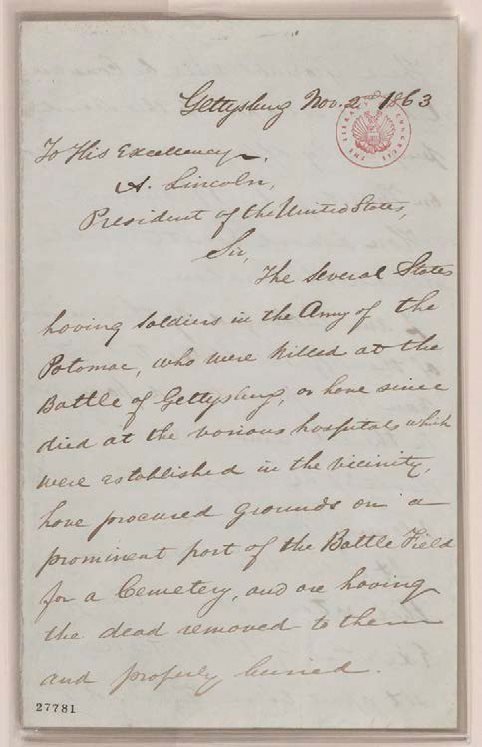
Here is the letter from David Wills asking President Lincoln to speak at Gettysburg in 1863.
Perhaps, Wills did get a poet to speak. President Lincolns words werent the romantic verse of Longfellow, but they were certainly poetic. On November 19, 1863, Lincoln poetically called for the nation to do the unfinished work which they who fought here have thus far so nobly advanced. Everett later wrote to Lincoln,Permit me to express my great admiration of the thoughts expressed by you, with such eloquent simplicity and appropriateness, at the consecration of the Cemetery. I should be glad, if I could flatter myself that I came as near to the central idea of the occasion, in two hours, as you did in two minutes.
Ideas were precisely the reason why Lincolns speech was so important. Lincoln drew listeners attention, not to the Constitution, but to the Declaration of Independence: all men are created equal. Now, we hold the Gettysburg Address as a pillar of our country. In the Lincoln Memorial in Washington, DC, the Gettysburg Address is written on the walls.
The speech about those who died in battle has become more famous than the battle itself, perhaps because the speech gave meaning to the battle. Lincoln was able to summarize why the war was so important. He gave meaning to why the dead had died. They gave their lives so that the idea of America could exist. Freedom for everyone was more important than their individual lives. They, like Lincoln, believed in the concept of America. A countrys government should be for the people and by the people. Democracy can exist. Lincolns address may have been short, but it rang large. To truly understand these 272 words, we must understand the unique man and the devastating war that led to the Gettysburg Address.
CHAPTER ONE
THE EARLY LIFE OF ABRAHAM LINCOLN
T he Gettysburg Address was written by a president with only one year of formal schooling. Abraham Lincoln was born on February 12, 1809, in Hodgenville, Kentucky. He lived in a one room log cabin on the south fork of Nolin Creek. His family had moved to Kentucky from Virginia, in hopes of finding better farmland. However, they struggled in Kentucky. The family moved to Indiana. Lincolns mother died when he was only eight years old.
After his mothers death, Lincolns chores around the house increased and kept him home from school. As the only son, Lincoln was expected to help his father with the farming. In Indiana, he was sent to a school that opened about a mile (1.6 kilometers) from the family farm, but it closed three months later. By the time he was fifteen, Lincolns formal education was over. He had attended school for just one year.
Thirst for Knowledge
Somehow, Lincoln managed to learn to read. His stepmother, Sarah Bush Lincoln, owned a few books. Although she could not read or write, she sensed that schooling was important and encouraged Lincoln to read. Between chores, Lincoln read Pilgrims Progress by John Bunyan, Aesops Fables, or the family Bible. As quoted in The Hidden Lincoln: From the Letters and Papers of William H. Herndon, Sarah Bush Lincoln later recalled,
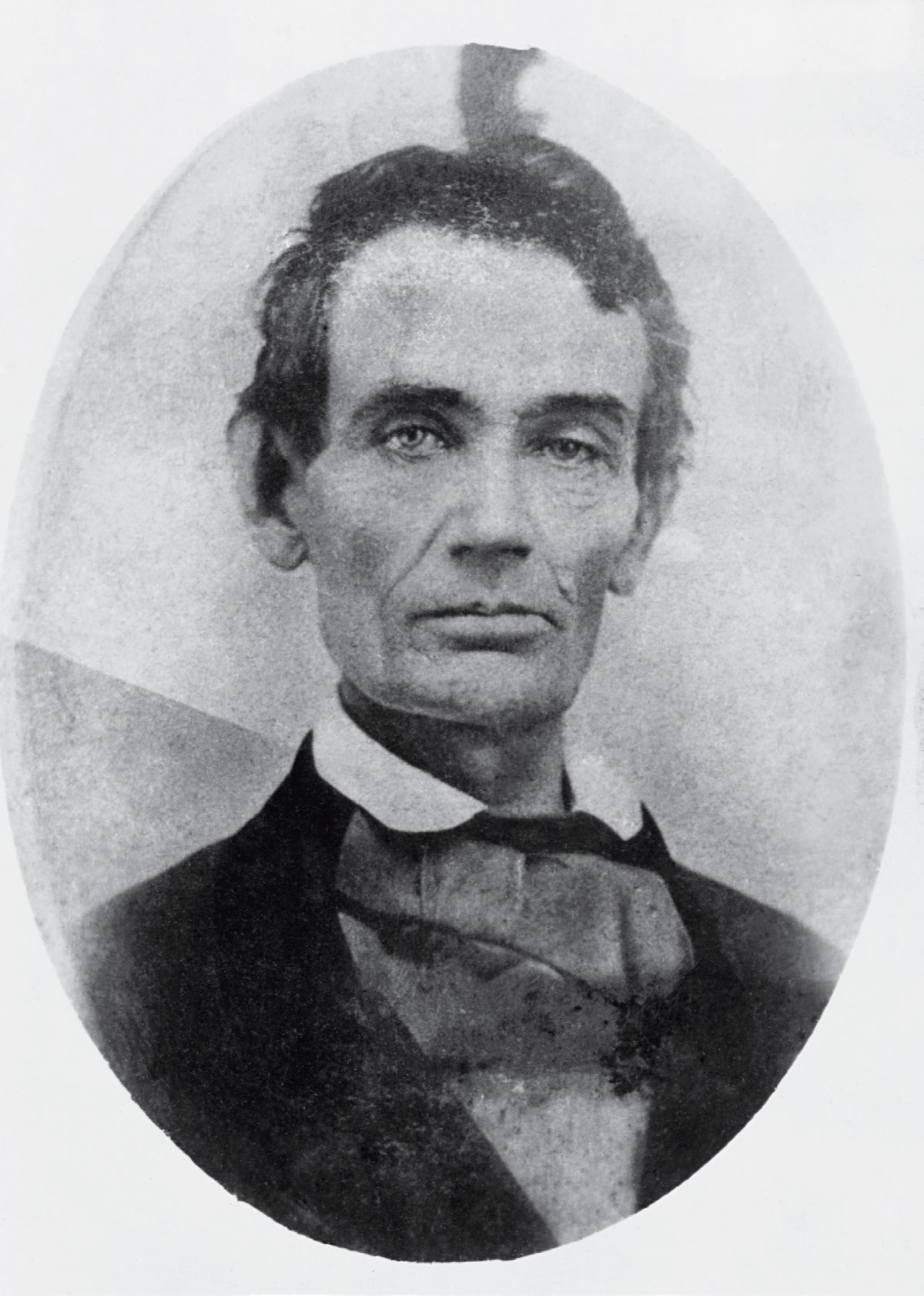
In 1861, Abraham Lincoln became the 16th president of the United States.
He [Lincoln] must understand everything, even to the smallest thing, minutely and exactly; he would then repeat it over to himself again and again, sometimes in one form and then in another, and when it was fixed in his mind to suit him he became easy and he never lost that fact or his understanding of it.
As Lincoln became more involved in reading and learning, his work around the farm suffered. His father knew that Lincoln was not meant to be a farmer. By the time he left home at eighteen, Lincoln had grown to six feet four inches tall (1.9 meters). He had only one total year of schooling, yet he possessed a burning desire to be something other than a farmer.
Lincolns Draw to Politics
Lincolns next few years were spent in search of a career. While learning to survey the Illinois countryside, to pilot riverboats, and to manage a country store, Lincoln discovered an interest in politics and an ability to speak publicly. A very tall man for the time, he drew attention wherever he spoke. To his thoughtful speeches given around Illinois, he often added colorful tales of growing up in the country.
Next page
